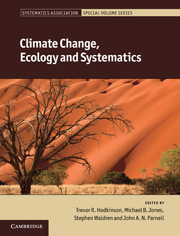Book contents
- Frontmatter
- Contents
- List of contributors
- Preface
- Section 1 Introduction
- Section 2 Adaptation, speciation and extinction
- 4 Global climate and extinction: evidence from the fossil record
- 5 Long-term fluctuations in atmospheric CO2 concentration influence plant speciation rates
- 6 Wood anatomy and climate change
- 7 Savanna biome evolution, climate change and the ecological expansion of C4 grasses
- 8 Climate warming results in phenotypic and evolutionary changes in spring events: a mini-review
- 9 Terrestrial green algae: systematics, biogeography and expected responses to climate change
- Section 3 Biogeography, migration and ecological niche modelling
- Section 4 Conservation
- Index
- Systematics Association Publications
- Plate section
- References
8 - Climate warming results in phenotypic and evolutionary changes in spring events: a mini-review
from Section 2 - Adaptation, speciation and extinction
Published online by Cambridge University Press: 16 May 2011
- Frontmatter
- Contents
- List of contributors
- Preface
- Section 1 Introduction
- Section 2 Adaptation, speciation and extinction
- 4 Global climate and extinction: evidence from the fossil record
- 5 Long-term fluctuations in atmospheric CO2 concentration influence plant speciation rates
- 6 Wood anatomy and climate change
- 7 Savanna biome evolution, climate change and the ecological expansion of C4 grasses
- 8 Climate warming results in phenotypic and evolutionary changes in spring events: a mini-review
- 9 Terrestrial green algae: systematics, biogeography and expected responses to climate change
- Section 3 Biogeography, migration and ecological niche modelling
- Section 4 Conservation
- Index
- Systematics Association Publications
- Plate section
- References
Summary
Abstract
The impact of climate change, in particular increasing spring temperatures, on life-cycle events of plants and animals has gained scientific attention in recent years. Leafing of trees, appearance and abundance of insects, and migration of birds, across a range of species and countries, have been cited as phenotrends that are advancing in response to warmer spring temperatures. The ability of organisms to acclimate to variations in environmental conditions is known as phenotypic plasticity. Plasticity allows organisms to time developmental stages to coincide with optimum availability of environmental resources. There may, however, come a time when the limit of this plasticity is reached and the species needs to adapt genetically to survive. Here we discuss evidence of the impact of climate warming on plant, insect and bird phenology through examination of: (1) phenotypic plasticity in (a) bud burst in trees, (b) appearance of insects and (c) migration of birds; and (2) genetic adaptation in (a) gene expression during bud burst in trees, (b) the timing of occurrence of phenological events in insects and (c) arrival and breeding times of migratory birds. Finally, we summarise the potential consequences of future climatic changes for plant, insect and bird phenology.
Introduction
The recent resurgence of interest in phenology (the timing of recurring life-cycle events in plants and animals) has stemmed from research on the impact of climate change, in particular, global warming.
- Type
- Chapter
- Information
- Climate Change, Ecology and Systematics , pp. 176 - 200Publisher: Cambridge University PressPrint publication year: 2011
References
- 5
- Cited by

